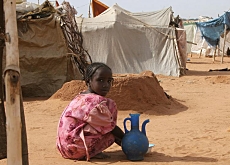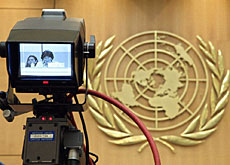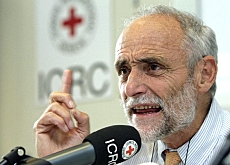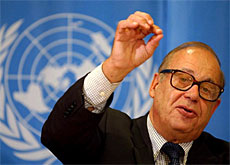Ziegler calls for UN intervention in Darfur

The United Nations Special Rapporteur on the Right to Food, Switzerland's Jean Ziegler, has demanded the UN intervene in western Sudan's Darfur.
Ziegler, presenting his annual report in New York, said that the war-torn region represented the worst current humanitarian crisis.
The Geneva sociologist added that the UN had the right to intervene to help local populations without the authorisation of the Sudanese government. Ziegler, who has yet to travel to Darfur, said this was the only way of setting up proper and secure humanitarian corridors.
The UN rapporteur recalled that during its recent conflict with Lebanon’s Hezbollah militia Israel had cut off humanitarian corridors, thereby setting a bad example for others to follow.
Ziegler said Sudan’s president, Omar al-Bashir, was doing the same to hinder aid arriving in Darfur. Eight UN humanitarian workers were killed in the region this summer.
The sociologist was also to present his findings on Lebanon to the UN General Assembly. This section of his report was already criticised before it was released.
The Israelis said he was biased towards Hezbollah after he met a Lebanese government minister who was a member of the Shiite movement during his trip to the Middle East.
Ziegler was forced to cancel the Israeli portion of his visit and forced to cut short his stay in Lebanon. The rapporteur has rejected accusations of bias, saying that the Israelis wanted to turn attention away from his findings.
Ruined land
According to the sociologist, Israel resorted to massive bomb attacks during the last 72 hours before a ceasefire, and ruined agricultural land providing nourishment for one million people.
He added that watercourses were polluted and that 450 towns and villages had been destroyed in Lebanon. Since fighting stopped, Ziegler added, the Israelis have also refused to hand over maps showing where they dropped cluster bombs.
A draft resolution submitted to the UN General Assembly demands Israel hand these maps to the organisation, and that the UN support Lebanon’s efforts to extract compensation for damage wrought during the war.
The rapporteur said that Israeli attempts to shut down humanitarian corridors during the conflict should also be considered war crimes.
Ziegler, whose mandate will be reviewed by the UN’s Human Rights Council next June, also produced reports this year on the food situation in India and Guatemala. He hopes to get to Sudan in 2007 after his visits were refused twice.
The rapporteur also intends to travel to Myanmar, where farmers are used as forced labour, and North Korea, where an estimated 30 per cent of the population has been starving for the past 12 years.
swissinfo with agencies
The crisis in Sudan’s western Darfur region began in 2003 with an attack on government military outposts by insurgents from three black African communities.
Government troops supported by Arab militias retaliated, killing up to 70,000 men and deliberately driving more than two million people from their homes, most of whom became internally displaced.
Since the outbreak of fighting, at least 200,000 people are believed to have died.
There are more than 11,000 humanitarian workers on the ground in Darfur, but fewer than 100 staff with protection responsibilities, along with a few thousand lightly armed African Union troops.

In compliance with the JTI standards
More: SWI swissinfo.ch certified by the Journalism Trust Initiative



You can find an overview of ongoing debates with our journalists here. Please join us!
If you want to start a conversation about a topic raised in this article or want to report factual errors, email us at english@swissinfo.ch.